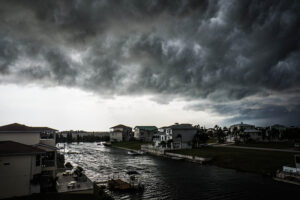Staying safe starts with being prepared
 For nearly four decades, helping communities prepare for, respond to, recover from, and mitigate against disasters remains IEM’s priority.
For nearly four decades, helping communities prepare for, respond to, recover from, and mitigate against disasters remains IEM’s priority.
This year is expected to be the seventh consecutive record-breaking Atlantic hurricane season, according to the National Oceanic and Atmospheric Administration (NOAA). Experts have predicted as many as six major hurricanes could occur between June 1 and November 30. Last year the Atlantic was forecasted to experience an above-average hurricane season, which ended with 21 named storms, exhausting the list of names for the second year in a row.
Although disasters can be unpredictable, IEM helps emergency managers and government officials at the state, local, tribal, and territorial levels take the guesswork out of hurricane preparedness by creating more resilient infrastructure systems that help communities more quickly recover and rebuild following a storm.
We know that staying safe starts with being prepared. Planning saves time, money, and most importantly, lives. Below are some easy steps to start your hurricane preparedness journey.
- Know and Understand Your Risk: Find out if your area is at risk for hurricanes, which can affect coastal and inland areas, causing storm surges, heavy rainfall, flooding, severe wind, and tornadoes.
- Make a Plan: Create an emergency plan tailored to your household’s needs and then practice it. Make sure each person has a written copy of the plan, which can come in handy in case of any disaster or emergency.
- Know Evacuation Zones and Routes: You may need to evacuate in the event of a hurricane, so it is important to know your evacuation zone ahead of time and what route to take to get to safety.
- Review Your Homeowners or Renters Insurance: Make sure your home and property (including contents) are covered for potential water and flood damage caused by a hurricane or severe storm. Remember that flood insurance requires a 30-day waiting period.
- Gather Necessary Supplies: Stock up on at least 72 hours’ worth of nonperishable food, water, hand sanitizer in case the hurricane cuts off your power and water supply. Keep electronics charged and have an alternative emergency power source. It is advisable to ensure you always have at least five days of prescription medicine on hand. Don’t forget about your pets too!
- Make Your Home More Resilient: Trim trees on your property, clear gutters, and clean drains, install hurricane shutters. If a hurricane is approaching secure outdoor furniture or other objects that could become projectiles and if necessary, move your vehicle(s) to a safe location.
- Stay Informed Sign up for emergency alerts from your local government on your phone. Always follow local guidance regarding evacuation instructions and monitor the National Weather Service and the National Hurricane Center for storm updates.
- Protect Your Pets and Animals: Keep animal vaccination records in a safe place along with a recent photo of your pets in case they are separated from you. Get plenty of pet supplies and confirm which hotels and shelters are pet-friendly if you need to evacuate.
- Gather Important Documents: Make sure all your important paperwork, including up-to-date insurance policies and identification documents, are protected, in a safe, easily accessible place. Place the items in a water-tight container in case you must evacuate.
- Follow Centers for Disease Control and Prevention and Local Guidance in Shelters: Locate local emergency shelters and closely follow emergency management procedures. Bring face coverings and cleaning items, and practice social distancing when possible while at shelters.
- Avoid Floodwater: Do not drive or swim in areas that have flooded due to a hurricane. Move to higher ground – but avoid attics – and follow flood warnings.
- Review Generator Safety: Avoid carbon monoxide poisoning by placing portable generators outside of the home and away from windows. If the power goes out, do not drink or cook with tap water unless deemed safe by local officials.
- Assess and Report Damage: Document damaged property and take photographs for your records. Report losses to your insurance company before you begin repairs.
- Clean Up Your Home: Follow safety precautions when cleaning up after a hurricane. Wear protective gear and do not touch wet electrical equipment.
- Take Care of Your Mental Health: Hurricanes can cause stress and anxiety. Take care of your mental health before, during and after a hurricane and get the help you need to cope with strong emotions.
Want to learn more? Follow us on Facebook, Twitter, or LinkedIn to stay tuned for more preparedness tips this hurricane season.




